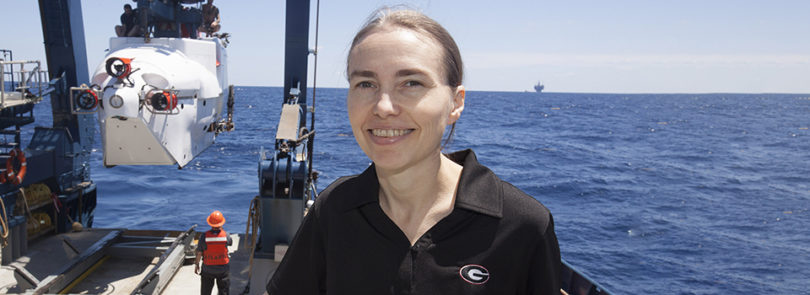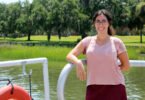Five years ago, on April 20, 2010, the Deepwater Horizon oil well drilling platform exploded in the Gulf of Mexico. The ensuing Macondo well blowout resulted in the discharge of around 5 million barrels of oil into the Gulf. The University of Georgia’s Samantha Joye was one of the first scientists to investigate the disaster to document its impact on the Gulf ecosystem.
In the years since, Joye, UGA’s Athletic Association Professor in Arts and Sciences and professor of marine sciences, has led multimillion dollar research efforts to understand the fate of the oil, the impact of the oil on the ecosystem and the recovery of the Gulf. The most recent of these efforts is the Ecosystem Impacts of Oil and Gas Inputs to the Gulf, or ECOGIG, project, funded by the Gulf of Mexico Research Initiative. ECOGIG, which recently received an additional three years of funding, is a research consortium led by Joye and comprised of 29 investigators from 14 institutions.
Immediately following the disaster, UGA and Georgia Sea Grant, a unit of UGA’s Public Service and Outreach, launched a comprehensive strategy to respond to the crisis through a collaborative effort of research and public service. UGA scientists fulfilled a critical role by providing national and state leaders, the disaster response team and the public with up-to-date impartial information about the fate of oil and natural gas.
“Getting out on to the water quickly and obtaining multiple samples during the first 10 months of the disaster allowed our team to discover unprecedented phenomena,” said Joye, referring to the presence of sub-surface plumes in the water column and weathered oil on the seafloor. “The sampling we began in May 2010 continues today and coupled with collaborative laboratory experiments, our work is advancing knowledge of where the Macondo oil went and is documenting its impacts on various aspects of the Gulf ecosystem, from the water column to the deep sea floor.”
UGA’s Franklin College of Arts and Sciences, Georgia Sea Grant and UGA Public Affairs Division also organized a symposium drawing key leaders from local governments in the Gulf of Mexico, federal agencies and academia to discuss communication gaps in the response efforts.
“In quickly mobilizing scientists and public relations experts, UGA and Georgia Sea Grant provided tremendous value in helping to dispel misinformation while informing response planning,” said David Lee, UGA vice president of research. “We believe important lessons were learned about maintaining the public’s trust and confidence in times of crisis.”
Drawing international media attention, UGA received the Council for Advancement and Support of Education (CASE) National Gold Award for getting objective scientific information on the disaster to state and national decision makers, federal agencies and the general public.
On the research side, Joye, who has studied the natural seepage of oil and gas in the Gulf for more than 20 years, has received 11 external grants and published 29 peer-review journal articles in the past four years alone. In 2015, she received the Southeastern Conference Faculty Achievement Award for her work building bridges between the fields of chemistry, microbiology and geology to better understand marine and coastal ecosystems. In 2014, she was named a Fellow of the American Association for the Advancement of Science, the world’s largest general scientific society.
As a recognized source for timely and unbiased scientific information, the University of Georgia and Georgia Sea Grant continue to serve national, state and local decision makers and the entire state of Georgia in matters of critical environmental and economic concern.







